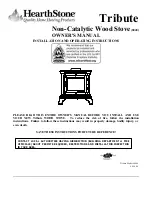
HearthStone
Quality Home Heating Products Inc
®
Tribute Model 8040
7
Floor protector’s come with various types of
specifications. To convert a floor protector’s specification
to an R-value, do one of the following:
•
If the R-value is given, use that value—no
conversion is needed.
•
If a k-factor is given with a required thickness
(T) in inches, use this formula: R-value = 1/k x T
•
If a C-factor is given, use the formula: R-value =
1/C
To determine the R-value of the proposed alternate floor
protector:
•
Use either the k-factor or the C-factor formula
explained above to convert specifications not
expressed as R-values.
•
For multiple layers of floor protectors, simply
add the R-values of each layer to determine the
overall R-value of the layers.
If the overall R-value of your setup is greater than the
R-value of the specified floor protector, then your setup is
acceptable.
Noncombustible Material
Thickness
R-value
Gypsum or plaster board
1
1
/
2
″
0.45
Wallboard, Wonderboard, or
Durock
1
1
/
2
″
0.20
Ceramic board (Fiberfrax or Micor)
1
1
/
2
″
1.10
Nominal solid clay brick
1
1
″
0.20
Ceramic wall or floor tile
1
1
/
4
″
0.01
Mineral wool insulation
2
1
″
3.12
Cement mortar
2
1
″
0.20
Horizontal still air
2
*
1
/
8
″
0.92
Handle Assembly
Locate the handle, bolt, and washers enclosed in the
envelope with the owner’s manual. Place the washers on
the bolt and then push it through the handle so that the
bolt threads extend through the bottom of the handle.
Using a slotted screwdriver, turn the bolt
into the chrome latch on the door, until snug.
Handle Operation
Front Door – when closed, the handle will
be in the 7 o’clock position. To open the
front door, rotate the latch clockwise to
approximately the 10 o’clock position.
O
UTSIDE
A
IR
S
UPPLY
(Kit #
90-53400
)
1
According to Intertek Testing Services, Inc.
2
According to ASHRAE Handbook of
Fundamentals 1977
An outside air source may
be connected directly to this
stove using an optional
outside air kit. The
advantage of providing
outside air directly to the
stove is that the air used by
the stove for combustion is
taken from outside of the
residence rather than from
within the room where the
stove is located. With
outside air supplied directly
to the stove, drafts within
the room and air infiltration
within the building are
reduced. Use of the outside
air kit may also improve
stove performance in a particularly airtight house.
The outside air kit for this stove allows for the direct
connection of the stove's air intake to a minimum 3" (76
mm) diameter duct (supplied by others) which leads to the
outside of the house. When considering placement of the
duct from the outside of the house to the hearth, keep in
mind the need to avoid structural members of the house.
The outside air kit will attach to the back of the stove.
The termination of the duct on the outside wall of the
stove should be located in such a manner so as to preclude
the possibility of obstruction by snow, leaves or other
material and should be screened against animals and
insects. The termination should be screened using
¼” x ¼” mesh rodent screen and be covered with a
rain/wind proof hood (flex pipe, outside termination,
mesh, and hood supplied by others) Contact your dealer
for availability).
BOLT
WASHER
WOOD HANDLE
HANDLE CRANK
(ATTACHED TO STOVE)
Code Compliant Masonry Fireplace
6"
Lental
9
or Listed ZC Fireplace
18
Mantle
10" max.
Stove 2" Maximum out of Fireplace - if stove is
more than 2" out, refer to alcove clearances.
10-1/2"
2" max.









































